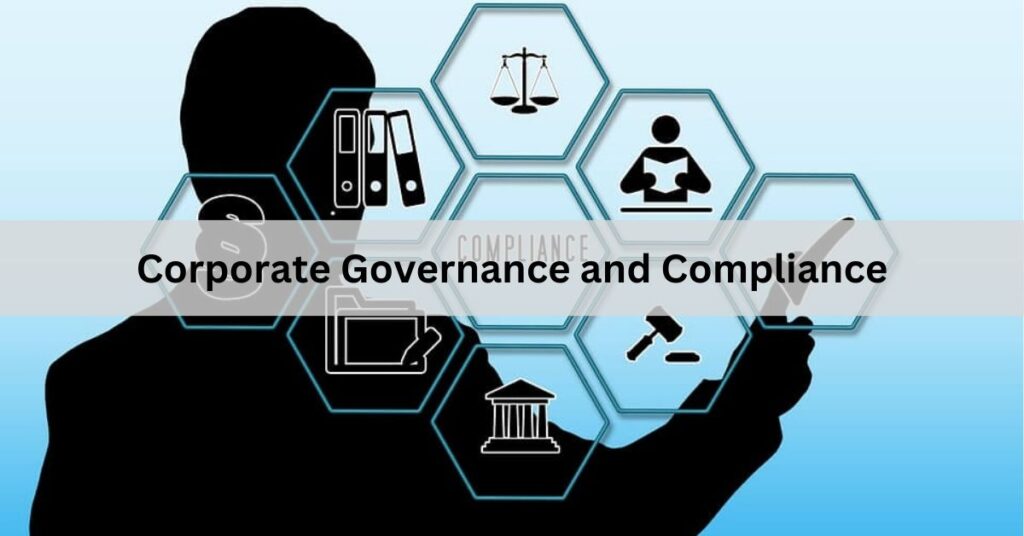Corporate governance and compliance are critical components of a successful business strategy, ensuring that companies operate with integrity, transparency, and accountability. Effective governance frameworks and robust compliance programs help organizations mitigate risks, meet regulatory requirements, and build trust with stakeholders. This article explores the key aspects of corporate governance and compliance, highlighting their importance and providing insights for implementation.
Contents
- 1 Understanding Corporate Governance
- 2 The Role of the Board of Directors
- 3 Key Principles of Corporate Governance
- 4 Importance of Compliance Programs
- 5 Developing a Compliance Framework
- 6 Regulatory Compliance
- 7 Ethics and Corporate Social Responsibility (CSR)
- 8 Risk Management
- 9 Case Studies of Successful Governance and Compliance
- 10 Conclusion
Understanding Corporate Governance
Corporate governance refers to the system of rules, practices, and processes by which a company is directed and controlled. It involves balancing the interests of various stakeholders, including shareholders, management, customers, suppliers, financiers, and the community. Effective corporate governance ensures that a company’s board of directors meets regularly, makes informed decisions, and oversees the management of the organization with integrity and accountability.
The Role of the Board of Directors
The board of directors plays a pivotal role in corporate governance. It is responsible for setting the company’s strategic direction, overseeing management, and ensuring that the company operates in the best interests of its stakeholders. The board must be composed of individuals with diverse skills and perspectives, and it should include independent directors who can provide unbiased oversight. Regular board evaluations and training are essential to maintain an effective governance structure.
Key Principles of Corporate Governance
Corporate governance is guided by several key principles, including accountability, transparency, fairness, and responsibility. Accountability ensures that management is answerable to the board and, ultimately, to the shareholders. Transparency involves the timely and accurate disclosure of financial and non-financial information, enabling stakeholders to make informed decisions. Fairness relates to the equitable treatment of all stakeholders, and responsibility emphasizes the duty of the board to act in the best interests of the company and its stakeholders.
Importance of Compliance Programs
Compliance programs are designed to ensure that companies adhere to legal and regulatory requirements, as well as internal policies and ethical standards. Effective compliance programs help prevent legal violations, reduce the risk of financial penalties, and protect the company’s reputation. They also promote a culture of ethical behavior and accountability within the organization. Key elements of a robust compliance program include risk assessments, policies and procedures, training and education, monitoring and auditing, and response and prevention mechanisms.
Developing a Compliance Framework
Developing a comprehensive compliance framework involves several steps. First, companies must conduct a thorough risk assessment to identify potential areas of non-compliance and prioritize them based on their impact and likelihood. Next, they should establish clear policies and procedures that align with legal requirements and industry best practices. Regular training and education programs are essential to ensure that employees understand their responsibilities and are equipped to comply with relevant regulations. Monitoring and auditing activities help detect and address compliance issues promptly, while effective response and prevention mechanisms ensure that any breaches are dealt with appropriately.
Regulatory Compliance
Regulatory compliance involves adhering to laws, regulations, and guidelines relevant to the company’s operations. These may include financial reporting standards, environmental regulations, data protection laws, and industry-specific requirements. Staying current with regulatory changes and implementing necessary adjustments to compliance programs is crucial to avoid legal penalties and maintain the company’s integrity. Engaging with regulatory bodies and participating in industry associations can help companies stay informed about emerging compliance trends and best practices.
Ethics and Corporate Social Responsibility (CSR)
Ethics and corporate social responsibility (CSR) are integral to effective governance and compliance. Companies must uphold high ethical standards in their operations and decision-making processes. This includes ensuring that business practices align with societal values, respecting human rights, and contributing positively to the community. CSR initiatives can enhance a company’s reputation, foster stakeholder trust, and create long-term value. Integrating ethics and CSR into the governance framework demonstrates a commitment to responsible business practices.
Risk Management
Risk management is closely linked to corporate governance and compliance. It involves identifying, assessing, and mitigating risks that could impact the company’s objectives and operations. Effective risk management strategies help companies navigate uncertainties, protect assets, and ensure business continuity. The board of directors and management must work together to establish a risk management framework that includes risk identification, risk assessment, risk mitigation, and risk monitoring. Regular reviews and updates to the risk management plan are essential to address evolving risks and ensure alignment with the company’s strategic goals.
Case Studies of Successful Governance and Compliance
Several companies have demonstrated successful governance and compliance practices, serving as models for others. For instance, Johnson & Johnson is renowned for its strong corporate governance framework and commitment to ethical conduct. The company’s Credo outlines its responsibilities to customers, employees, communities, and shareholders, guiding its decision-making processes. Similarly, Microsoft’s compliance program emphasizes transparency, accountability, and continuous improvement. The company’s Code of Conduct provides clear guidelines for ethical behavior, and its compliance initiatives are regularly reviewed and enhanced to address emerging risks and regulatory changes.
Conclusion
Corporate governance and compliance are essential for the sustainable success of any organization. They provide the foundation for ethical behavior, risk management, and regulatory adherence, ensuring that companies operate with integrity and accountability. By implementing robust governance frameworks and comprehensive compliance programs, companies can build trust with stakeholders, mitigate risks, and create long-term value. As the business landscape continues to evolve, staying committed to governance and compliance will remain crucial for achieving organizational goals and maintaining a positive reputation.



